Tech-Driven Solutions

The journey toward achieving your goals may be the most difficult endeavor you have ever undertaken; however, it is accompanied by undiluted challenges and triumphs. With an open-minded, optimistic approach and strategic steps that help you cross some hurdles, surely, you will unlock your full potential for success.
It arises from a recent research that Forbes conducted where it writes that 3% of the graduates who wrote down the goals ended up earning ten times as much as the other 97% put together ten years after their graduation. Another research by Datalligence.AI also pointed to the same percentage of people that actually attain success and how vague and general goals need to be specific, measurable, clear with no ambiguity at all.
In this blog, we shall explore what you need to do to achieve your goals, understand what is stopping you, and get you moving by providing practical strategies overcoming the obstacles in your way.

Did You Know? A Forbes study reports that only 3% of people who set their goals on paper achieve them. On the other hand, as reported in a Forbes study, those who write down their goals stand a 10 times better chance of achieving it.
Understanding Excuses: What’s Stopping You from Achieving Your Goals?
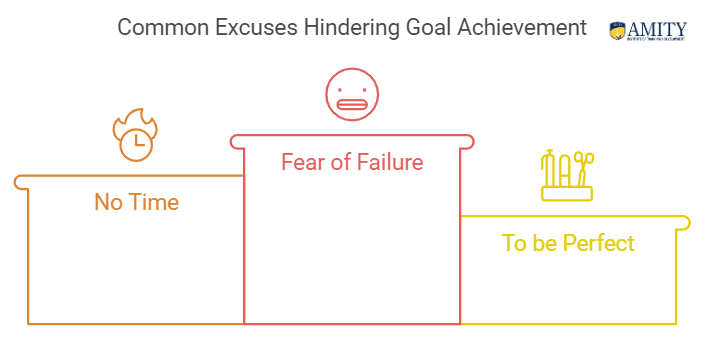
Excuses have their roots in fear, self-doubt, and procrastination. These are the psychological burdens that deter you from pursuing your goals to achieve them. Some of the usual excuses include:
- Fear of Failure: The fear of failure would make many take the road to nowhere and instead try to desecrate the real goals set.
- No Time: Lack of time is one of the usual excuses people present when asked about why they did not work on their goals.
- To be perfect: The need for everything to go well also produces the fewest results.
- To free yourself from these excuses: identify it as what it really is: self-imposed limitation.
Importance of Goal Setting: Achieving Your Goals
When a person sets definite goals and action targets, success will surely find its way. Goals direct one on what to do and give everything direction and purpose. Here are the 4 steps to achieve goals:

- Define Your Goals: Be more specific about what you want to achieve.
- Create an Action Plan: Break down your goals into actionable steps.
- Track Your Progress: Continuously see how much ground you have covered.
- Adjust When Necessary: Be flexible and willing to make changes in the plans.
With these steps, you can shape diffuse aspirations into real achievements.

(Source: Inc.)
How a Positive Mindset Can Help You Achieve Your Target
One of the major factors causing failure is a bad mentality. Because you end up with excuses and therefore inaction when you let self-doubt and fear of failure control you, it becomes pretty much impossible to achieve your goals in life. This involves realization of making mistakes as part of the journey and learning from them.
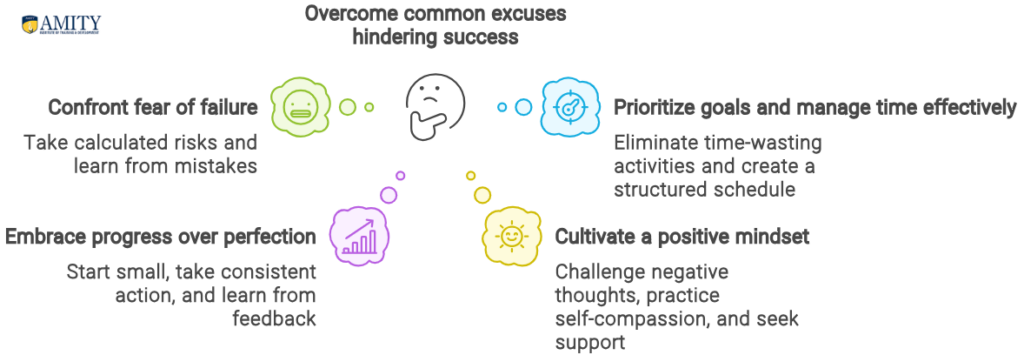
“He that is good for making excuses is seldom good for anything else.”- Benjamin Franklin
Whatever the mind believes, the body achieves. The body follows the mind. Goals sustain momentum. Seeing progress is addicting. No seriously, it is addicting because of the dopamine released in your brain after attaining a reward.
Just as a snowball grows as it is rolled down a hill, momentum works the same way. Whatever you were doing you probably did not want to stop because you were what Mikhail Csikszentmihalyi called “Flow” which is the optimal state of mental performance.
DO U KNOW ? that the fear of failure can be such a big emotional paralyzer, which stops people from acting? Due to a fear of failure, many people, according to a study published in the Journal of Personality and Social Psychology, do not pursue their goals as much, hence creating the phenomenon of a self-fulfilling prophecy.
But there are times when we have a bizarre tendency to give up the goals that we desperately wanted to achieve. There is a sense of “freeze” or developing a cold foot before we think to achieve what we have decided for ourselves. We feel as if there is this sense of being chained and held back. Something that is making us captive and not letting us be where we wanted to be. Let us explore together what holds us back from achieving our goals.
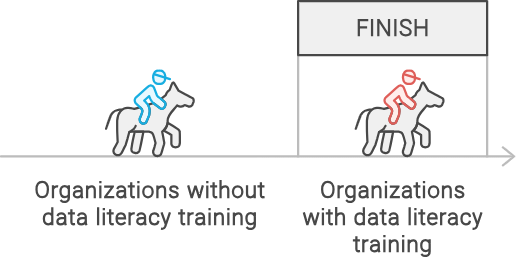
(Source: Lingaro)
DO YOU KNOW? Many organisations lack the appropriate funding for data literacy. In this survey, 78% of the organisations that have data literacy training hit their KPI for manufacturing cost—just 50% in those without.
What Are the Common Barriers to Achieving Your Goals?
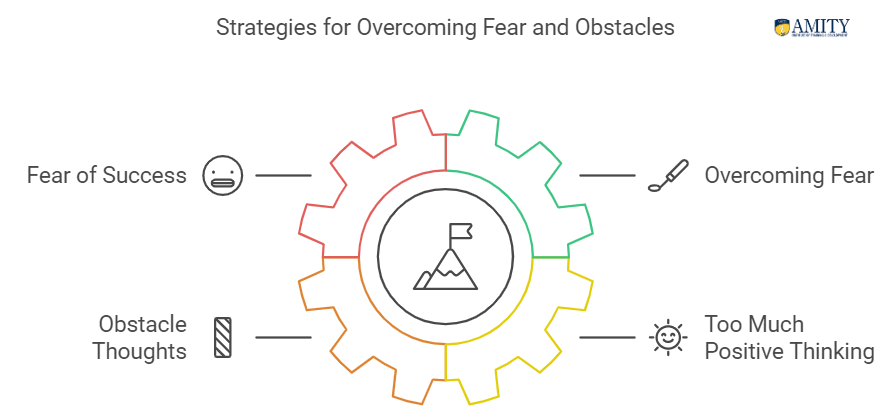
1. Fear of Success
Research first diagnosed the fear of success a couple of decades ago. Most scientists and psychologists agree that fear of success exists for both men and women. Fear of success is common, but many of us do not realize that we have it. Self-sabotaging activities – such as procrastination, negative self-talk, and fearing what success will bring – may hold us back from achieving our goals.
Fear of success is like the fear of failure. They have many of the same symptoms, the biggest problem for many people is that their fear of success is largely unconscious. They just do not realize that they have been holding themselves back from doing something great.
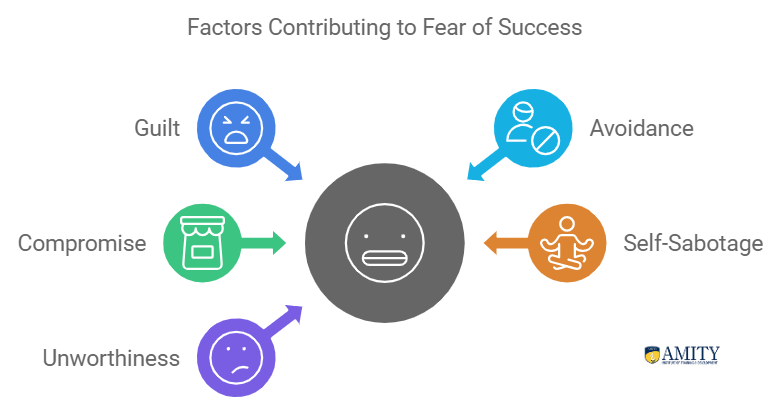
If you experience the following thoughts or fears, you might have a fear of success on some level –
- You feel guilty about any success you have, no matter how small, because your friends, family, have not had the same success. You do not tell others about your accomplishments.
- You avoid or procrastinate on big projects, especially projects that could lead to recognition.
- You frequently compromise your own goals or agenda to avoid conflict in a group or even conflict within your family.
- You sabotage your work or dreams by convincing yourself that you are not good enough to achieve them.
- You feel, subconsciously, as though you don’t deserve to enjoy success in your life. That success is something you just will not be able to hold on to if you do achieve it.. Eventually, you will fail, and end up back in a worse place than where you started. So, you think, “Is it worth enough?”
How to Keep Achieving Your Goals Despite the Fear of Success
The good news is that the more you face your fears, bring them to the surface, and analyse them rationally, the more you are likely to weaken those fears – and dramatically reduce your reluctance to achieve your goals.
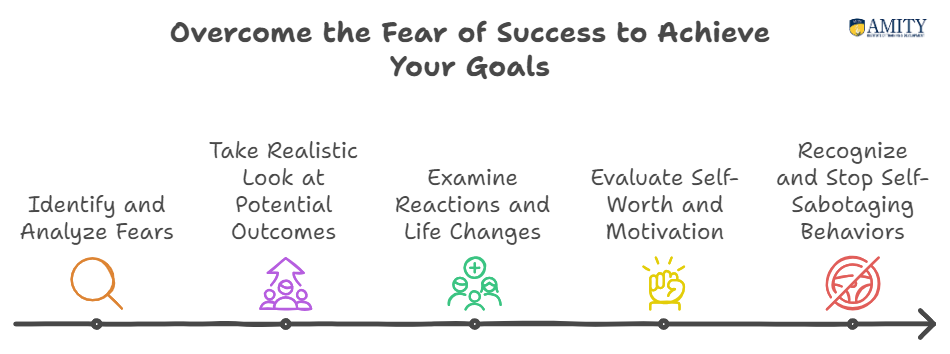
Take a realistic look at what will happen if you succeed with your goal. Do not look at what you hope will happen, or what you fear will happen. Instead, look at what is likely to happen. It is important not to give a quick answer to this. Take at least 15 minutes to examine the issues and write down your answers to questions like these.
- How will my friends and family react if I accomplish this goal? How will my life change?
- What is the worst that could happen if I achieve this goal? What is the best thing that could happen?
- Why do I feel that I do not deserve to accomplish this goal? How motivated am I to work toward this goal?
- What am I currently doing to sabotage, or hurt, my efforts? How can I stop those self-sabotaging behaviors?
Another useful technique is to address your fears directly, and then develop a backup plan that will overcome your concern.
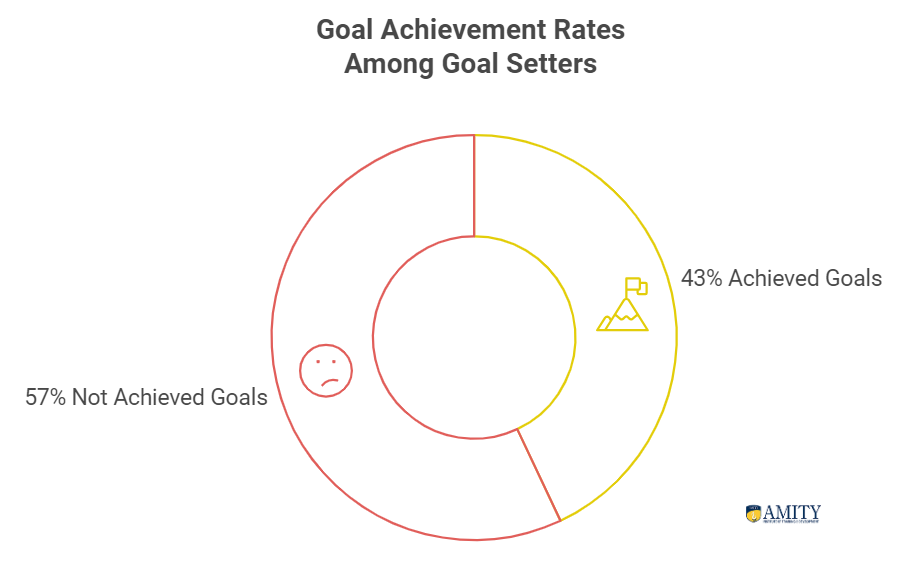
DO YOU KNOW? According to Dominican University, only 43% of goal-setters achieve the goals they set. Another study says that, considering the nature of visualization and envisioning the success of the goal, one can become twice as confident in attaining those goals.
2. Obstacle Thoughts
So, any time you set yourself a new goal, your mind automatically runs through all sorts of reasons why you can’t do that thing, and achieve that goal. That’s normal. So a new goal for you will be to do something different with that, which probably takes you out of this safe comfort zone. Because it may just be a bit unknown or uncomfortable and in which case your mind is doing its job to keep you safe (or perhaps fool you). It is creating obstacle thoughts to stop you from leaving the safety of what it knows.
Obstacle thoughts are the thoughts you are thinking now that stop you from producing the results that you want. Obstacle thoughts can sound like “I don’t know how to do it” or “I’ve never done this before”. They are the thoughts you are thinking about your new goal and if you choose to believe these thoughts, they will probably stop you from achieving your goal. They may also be holding you back from even starting to work towards your goal.
What Are the Steps to Achieving My Goals Despite Obstacle Thoughts?
- The even better news is that once you know what your obstacle thoughts are, you can stop using them as ammunition on yourself and can use them to create action steps or strategies to help you get to where you want to go. Firstly, in conquering your obstacle thoughts, write them down. Take your page and, at the top, write down your smart goal. Then, list all the obstacles and thoughts that come into your head when you think about attaining that goal. Once you have your obstacle thoughts on paper, you can see them objectively. You start to see how they are optional or not held.
- Secondly, challenge your thoughts and think of ideas to prove them wrong.
- The third step is to choose one of the new ideas from step two and put this action step into practice. Plan and put it in your diary. You must keep taking the action step repeatedly until it becomes a habit. Doing this provides your mind with evidence that you do know what to do. This allows your mind to continue to look for more evidence to prove this new thought is true.
3. Too much positive thinking
Dreaming of wonderful outcomes can feel great. Unfortunately, those feelings can stop us from doing the hard work necessary to make our goals a reality. If you want to change, you might want to confront your dreams with some hard, cold, even negative reality, studies show.
“It’s so pleasant to believe that positive fantasies will work,” says Gabriele Oettingen, a professor of psychology at New York University and the author of Rethinking Positive Thinking: Inside the New Science of Motivation. “But it’s too good to be true.” Dreaming about a positive future “can entice you into thinking you are already there. Then you do not get the energy to go there. Instead, you just lean back and enjoy the moment.”
How Mental Contrasting Aligns with Achieving Your Goals
Psychological research shows that we should start making pragmatic plans to accomplish our goals instead of simply dancing in daydreams. This means comparing those rosy visions with our current reality, identifying the obstacles, and finding the best way to overcome them. Research shows that most people fail to effectively engage the strategy in their daily lives, meaning that our good intentions remain wishful thinking, and we never reach our goals.

The research paper from Creatrix Campus, “Barriers to Student Success in Higher Education with Career Counseling,” emphasized career counseling in overcoming academic challenges. In a study on effective counseling, results showed increases in engagement, satisfaction, and stress reduction while simultaneously increasing the job placement rates of students, making the support in achieving educational goals very relevant.
What’s Holding You Back? Achieve Your Goals- Exemplify Excellence with AITD
Achieving your goals is a step toward success, but it does need a lot of commitment, planning, and proactive steps. Knowing the barriers that make you not move forward in life is part of working toward achieving your goal. Therefore, let us discuss the steps to achieving goals and how the Amity Institute of Training and Development (AITD) can assist you with them.
Role of AITD in Achieving Your Goals
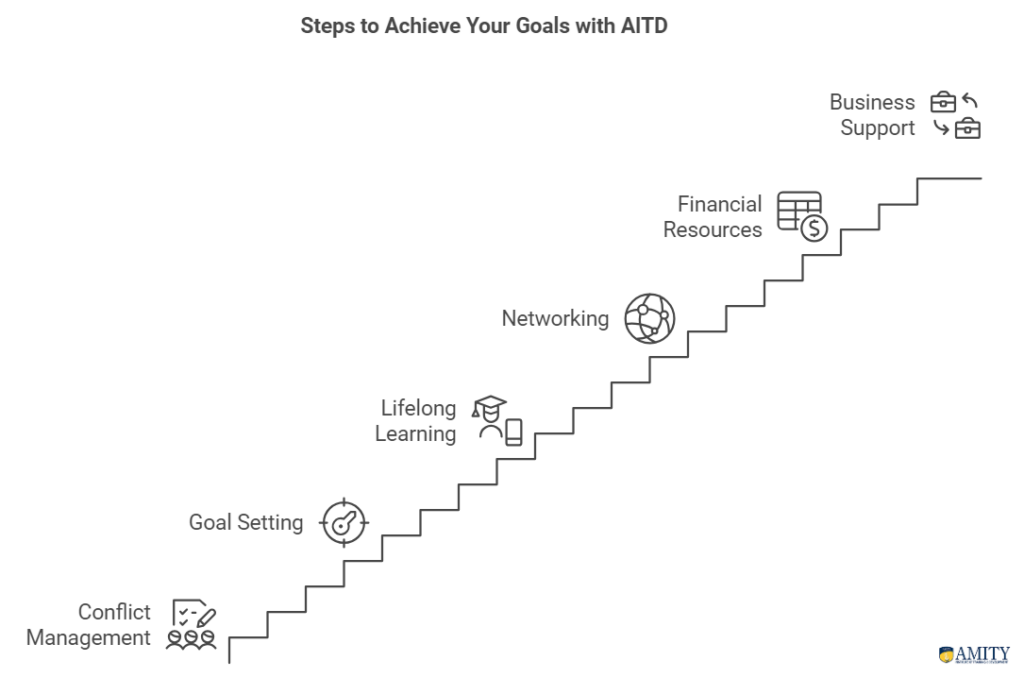
There are various things that AITD does which help people and organisations achieve higher levels. Its role includes giving conflict management training, which can be very important in the success of reaching high goals.
1. Conflict Management Training
AITD provides specialised training in conflict management. Such a skill will allow one to handle conflicts effectively. It is necessary for holding onto a great work environment and preventing your conflicts from causing your way to your goals to achieve.
2. Workshops on Goal Setting
Workshops on the 4 steps to achieve goals, AITD help you understand how SMART is setting objectives of the same. You would be guided to define specific, measurable, achievable, relevant, and time-bound objectives.
3. Learning Continues
AITD emphasizes lifelong learning, helping to constantly keep achieving their goals through learning and enhancing knowledge base and skill sets. This is necessary for competing in the current fast environment.
4. Networking and Teamwork
The AITD programs afford you the opportunities to connect with other professionals sharing the same aspiration. Through this network, you may easily achieve your target by cooperating and supporting one another.
5. Financial Goal Resources
AITD provides resources for people to achieve your financial goals. The different budgeting workshops from the investment strategies are held towards an appropriate practice for measures to drive in the realisation of one’s finances.
6. Business Goal Support
Its focused guidance to achieve your business goals has greatly helped entrepreneurs and business professionals. Sessions on strategic planning, mentorship programs, and more round out AITD’s offerings
Success Stories and Testimonials Success
With many testimonials for a proven track record in success in helping individuals and organisations realize their goals, AITD’s capabilities in this regard could very well be testimonial to successful attainment of positive goal improvement. A recent report indicated that 95% of its clients have seen great improvements in goal achievement after completing their programs.
One client, Sarah, related what happened between her and AITD: “Before this, I used to make excuses and excuses and then let the obstacles hold me back. But after receiving the training on conflict management and growth mindset from AITD, I was able to break through the barriers that were holding me back and I was able to meet my goals earlier than I could have ever even imagined.”
All with the right tools, coupled with a sunny disposition with such organisations as AITD, you set yourself up for doing more than you ever thought possible at the top and touched new heights. Never forget that it’s never too late to start anew and never stop achieving your goals.







